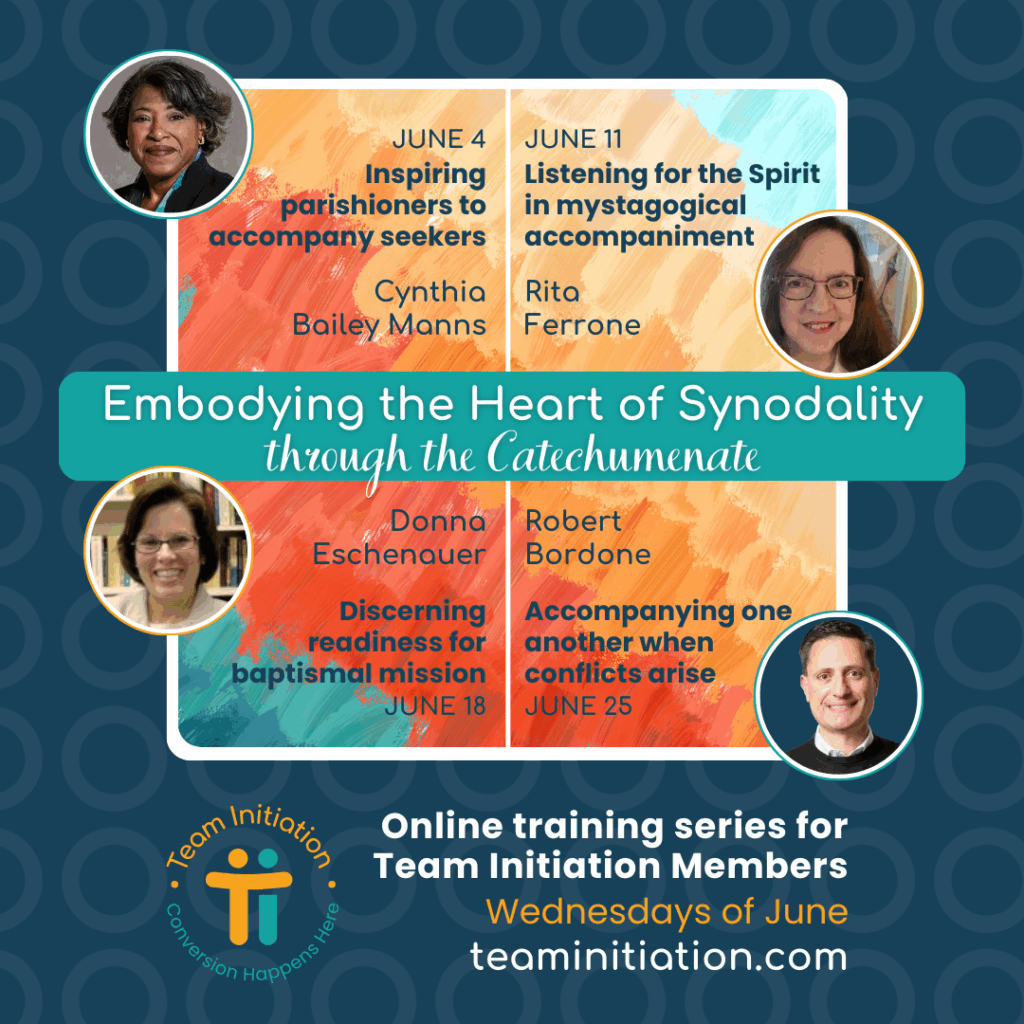I once had an inquirer who showed up “ready” to be baptized. He had taken an online course on Catholicism and was expecting to be initiated as soon as possible. I think he would have been happy to have been baptized that very day.
When catechumenate ministers ask me how we know if the seeker “knows enough” to be baptized, I sometimes tell them about that inquirer. He certainly knew enough in the sense that he had passed an online quiz about the doctrines of the church. But knowing Jesus goes much deeper than knowing doctrines.
As we walk along the journey of faith with our seekers, part of the “art of accompaniment” is a meaningful discernment of their readiness to serve as missionary disciples.
Listening for God’s voice
The discernment of readiness is not a rational weighing of pros and cons, but a deep listening and careful observation of the Spirit’s movement in a person’s life. Discernment isn’t about counting how many sessions someone has attended, how many dogmas they understand, or how many service hours they’ve completed. Those kinds of things matter, but their importance is secondary.
Rather, discernment is primarily about looking for the outward signs of an internal conversion of heart to Christ. When a person’s mind and heart turn more readily to Christ, we can observe it in their visible actions and attitudes.
The Order of Christian Initiation of Adults gives us clear guidelines for readiness at each period. For inquirers discerning readiness for the Rite for Entrance into the Catechumenate, we look for:
- The beginnings of the spiritual life
- The foundations of Christian doctrine have been planted
- Evidence of first faith and an initial conversion
- A desire to change their lives and enter a relationship with God in Christ
- The beginning of a sense of penitence
- The beginning of a habit of calling upon God in prayer
- A sense of the church and a first experience of the company and spirit of Christians (see OCIA 42)
For catechumens discerning readiness for the Rite of Election, expectations are higher. We look for:
- A conversion in mind and morals
- A sufficient knowledge of Christian doctrine
- A sense of faith and charity
- The intention to receive the sacraments of the Church.
- A resolve to express their intention publicly in the celebration of the rite (see OCIA 120)
If you look at each of these criteria closely, it will be evident that discernment cannot be done by a single individual. Throughout the seeker’s journey of faith, the entire Christian community is involved in the discernment process. The pastor, catechist, sponsors, godparents, delegates from the community, and the seekers themselves will be especially attentive to the signs of readiness, but the entire community contributes to the witness and testimony of the suitability of each inquirer or catechumen to become a disciple.
Collaborative discernment: A synodal path
This collaborative nature of discernment within the catechumenate process mirrors the church’s call to synodality. The Synod on Synodality’s final document describes synodality as “a path of spiritual renewal and structural reform that enables the Church to be more participatory and missionary, so that it can walk with every man and woman, radiating the light of Christ” (For a Synodal Church: Communion, Participation, Mission: Final Document, 28). The goal of the synodal process is to make the church more effective at evangelization by making it more participatory and inclusive. Let’s look at some ways in which the discernment process in the catechumenate mirrors synodality.
The entire church discerns
The Order of Christian Initiation of Adults says that for the Rite for Entrance into the Catechumenate, sponsors, catechists, deacons, and pastors are responsible for discerning the outward indications of a candidate’s dispositions (see OCIA 43).
For the Rite of Election, “Priests, Deacons and catechists as well as godparents and delegates of the local community; indeed, if this is appropriate, the group of catechumens” contribute to the discernment (OCIA 120). The order also says, “On the day of Election…the community itself…should take care to give a just and prudent testimony about the catechumens” (OCIA 9.3). This widespread participation in deciding readiness for initiation is a clear example of synodal listening and walking together.
Discernment is about patiently trusting the Holy Spirit’s timing and working collaboratively to recognize the signs of spiritual growth.
Listening to the People of God
Synodal practice relies upon the sensus fidei, the “instinct for truth of the Gospel” received through baptism. Discernment also relies upon the sensus fidei. One of the doctrines of the church that the seekers will learn is that the People of God cannot err “when they show universal agreement in matters of faith and morals” (For a Synodal Church: Communion, Participation, Mission: Final Document, 22). This collective response to the promptings of the Holy Spirit guides not only the church as a whole but also our local discernment processes for seekers.
Accompanying as walking together
The synodal process involves listening, praying, meditating, dialoguing, accompanying, discerning, deciding, and acting (see For a Synodal Church: Communion, Participation, Mission: Final Document, 29). This could also be said of the role of catechumenate teams as we walk with seekers. We are companions, literally “those we share bread with,” helping seekers hear and see things they might otherwise miss. We don’t just observe; we are active participants in their spiritual journey.
Avoid the “rush to discernment”
Often, sometime in January, there is a kind of rush to discernment when an e-mail goes out from the diocesan office requesting the names of those catechumens who will be coming for the Rite of Election. But discernment should not be a rush to meet deadlines.
Discernment is about patiently trusting the Holy Spirit’s timing and working collaboratively to recognize the signs of spiritual growth. When discernment is done with openness and trust in the Spirit of truth, it helps both the seeker and the parish community encounter Christ more deeply and draws us more fully into conversion of mind and heart.
The art of discernment in the catechumenate is both challenging and rewarding. By embracing this collaborative approach, remaining flexible in our expectations, and always trusting in the guidance of the Holy Spirit, we enter into a rich and meaningful initiation process that nurtures the growth of new disciples. We not only guide seekers but also deepen our own spiritual lives, learning to recognize the subtle movements of the Spirit in our midst.
You are an example for the whole parish
As we said, your ministry in the catechumenate is a mirror of the synodal process. But it is more than that. It is also an example and inspiration to the rest of the parish to walk with each other in faith as the Holy Spirit guides us to truly become the People of God.
This month: A Journey of Accompaniment and Mission!

Team Initiation Members—don’t miss our upcoming exclusive four-part online speaker series:
Embodying the Heart of Synodality through the Catechumenate
Join us as we explore what it means to walk with seekers and parishioners in a spirit of accompaniment.
📅 Mark your calendars:
Four Wednesdays in June 2025
11:00am Pacific / 2:00pm Eastern
(June 4, 11, 18, and 25)
👉 This series is available only to Team Initiation Members.
Not a member yet? Click here to join today.











